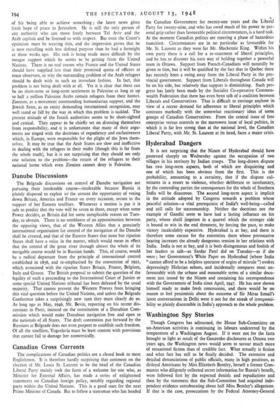Canadian Cross Currents
The complications of Canadian politics are a closed book to most Englishmen. It is therefore hardly surprising that comment on the election of Mr. Louis St. Laurent to be the head of the Canadian Liberal Party mainly took the form of a welcome for one who, as Minister for External Affairs, has made a series of enlightened statements on Canadian foreign policy, notably regarding regional pacts within the United Nations. This is a good start for the next Prime Minister of Canada. But to follow a statesman who has headed the Canadian Government for twenty-one years and the Liberal Party for twenty-nine, and who has owed much of his power to per- sonal grip rather than favourable political circumstances, is a hard task. At the moment Canadian politics are entering a phase of hazardous transition. Circumstances are in no particular as favourable for Mr. St. Laurent as they were for Mr. Mackenzie King. Within his own party there is a call for a re-statement of liberal principles, and he has to discover his own way of holding together a powerful team in Ottawa. Support from French-Canadians will naturally be given to him, but it will be qualified by the fact that in Quebec there has recently been a swing away from the Liberal Party in the pro- vincial government. Support from Liberals throughout Canada will be on his side, but relatively that support is diminishing. Such pro- gress has lately been made by the Socialist Co-operative Common- wealth Federation that there has even been talk of a coalition between Liberals and Conservatives. That is difficult to envisage anyhow in view of a recent demand for adherence to liberal principles which contrasts markedly with the somewhat reactionary ideas of some groups of Canadian Conservatives. From the central issue of free enterprise versus controls to the narrowest issue of local politics, in which it is far less strong than at the national level, the Canadian Liberal Party, with Mr. St. Laurent at its head, faces a major crisis.


































 Previous page
Previous page